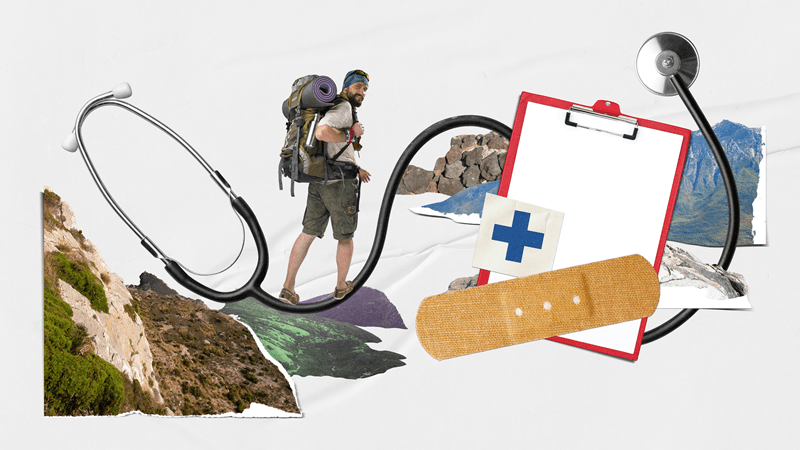Travel Insurance: Why You Need It And How Does It Work?
Travel Insurance: Why You Need It And How Does It Work?


Arranging for travel insurance before jetting off on vacation probably isn't high on the fun factor, but it's one of the most important. The worst-case scenario is always lurking around the corner and can be extremely costly when disaster strikes. If you're traveling soon, check your travel insurance policy to ensure you've got the right coverage for the activities you'll be undertaking on your trip. If there are any gaps in your coverage, take steps to correct them. It might feel like an unnecessary expense, but you definitely won't think that when your costs start piling up.
What Is Travel Insurance?
Travel insurance is a policy that covers you for medical care, trip cancellation, lost luggage, and more. Many types of travel insurance policies vary in coverage, so it's essential to understand which kind of policy you need. While many people think their credit card will cover them for travel mishaps, that's not always the case. While credit cards may provide car rental insurance and roadside assistance, they don't often offer travel health insurance — a big difference.
Why Should You Get Travel Insurance?
It helps you protect yourself and your family from the financial burden of medical bills and funeral costs by purchasing travel insurance before leaving on an international trip. It also keeps you from a wide variety of other potential disasters as well., such as the following: -
Medical care: Getting sick on vacation is the worst possible scenario. However, unexpected health problems or serious accidents can happen at any time. That's why it's crucial to have travel insurance. You will receive the appropriate care, whether that means being transported to a hospital or having a loved one flown in to be with you. Because, understandably, avoiding sugary snacks can be challenging in a foreign environment, dental care is also included. Your travel insurance will also cover other costs.
With travel insurance, you can also benefit from hospitalization without paying out of pocket. Verify that your trip insurance protects you in the event of a pandemic, precisely one involving COVID-19.
Emergency medical situations, like a broken limb, require you to visit a hospital.
With travel insurance, you have no worries about a medical evacuation if you or a loved one needs to be taken from an accident or other emergency scene to the nearest hospital. Your travel insurance will also cover the cost of returning you to your home country if you are hospitalized and need to return there for additional treatment or to be with your family.
Flight delays: The risk of missing a connecting flight, which can mean you miss your entire trip. This is a reasonably typical error these days. It may be due to any issues with the airline, a natural disaster, or a personal problem. You can expect to receive either a reimbursement or a refund of the specified amount following the policy's payout schedule.
A severe illness or death are two examples of unforeseen events that can derail your plans. Let's say you've decided to scrap your trip. Where does the money go that you used to buy the plane ticket and reserve the hotel room? Not a drop of it is lost.
Your travel insurance will pay for any unused hotel stays or plane tickets. Your flight may be delayed, but your travel insurance will cover any costs you incur. It could mean an unanticipated expense like a hotel room and dinner.
Loss of luggage, passport, or other documents: As far as travel emergencies go, this is about as bad as it gets. However, assistance is at hand if you have purchased travel insurance. Your insurance policy will cover the cost of a replacement or duplicate passport if you lose your original.
If your baggage goes missing, you'll get up to a certain amount compensated for your loss; if it's delayed, you'll get money back to cover any necessities you have to buy in the meantime. This can be very helpful while waiting for your bags to arrive.
Fraudulent charges: What if you lost your credit or debit card while on vacation and then started receiving alerts that it was being used? I know, right? You're losing money in a place where you might not be able to get much assistance if you need it. But if you had travel insurance, you wouldn't have to worry about it. Your policy will reimburse financial losses incurred as a result of lost or stolen payment cards for up to 12 hours before you report the loss.
How Does Travel Insurance Work?
When you buy travel insurance, you're essentially paying a premium to protect yourself against certain events that are likely to happen while traveling — like getting sick or hurt, missing a flight, or needing to cancel your trip.
The insurance company collects a one-time fee from you for coverage for your entire trip. If you need to file a claim, the insurance company will reimburse you for the expenses you incur. In most cases, you'll need to file a lawsuit to receive reimbursement for any travel—related fees, including medical costs.
Important things to look out for in Travel Insurance
- Your destination - If you're traveling to a tropical region, you'll need a more robust policy than visiting a temperate area. Tropical regions have an increased risk of diseases like malaria.
- Your age - If you're younger than 65, you'll need travel insurance to visit many countries. Insurance companies consider you a higher risk because you're more likely to incur a significant illness or injury. Additionally, older travelers are often better at navigating a foreign environment and are less likely to face serious difficulty.
- Your health - If you have a chronic illness, it's essential to disclose this information to your insurer so that any complication arising from a pre-existing condition can also be covered in the policy.
- The activities: If you're planning to scuba dive, skydive, or take part in some other high-risk activity, you'll need a more robust policy that covers possible injuries, accidents, and death.
Why Purchasing Travel Insurance Worth It?
Picture this: You've escaped the office and are about to go on vacation. Your flight arrives on time, and the weather is good. However, your bags disappear after that. You lose all your traveler's checks or get sick abroad and require hospital care. You'll soon understand it's a nightmare. Having foreign travel insurance is vital. Your vacation might be any place. Choosing the most acceptable travel insurance policy protects against unexpected problems that could ruin your trip.
3 Tips For Finding The Right Travel Insurance Plan
- Choose your provider carefully. When comparing travel insurance plans, be sure you're comparing apples to apples. Make sure each policy includes the coverage that you need.
- Understand the exclusions. Every travel insurance policy has exclusions. Learn the policy's ins and outs and whether or not you'll be responsible for out-of-pocket costs.
- Research your options. Many companies offer travel insurance policies. Be sure that you're comparing policies from reputable companies. If you've found a policy that meets your needs but is still unclear whether it's worth purchasing, you can use this helpful tip to decide: Ask yourself how much a day you would need to pay for travel insurance. If the answer is less than the potential costs of an emergency, it's probably worth it.
Conclusion
Travel insurance helps keep you and your family safe and protected from many unfortunate circumstances that could derail your vacation plans. It's one of the best decisions to make while you plan your next trip. Continue reading our blog Insuranceandleisure.com to stay updated on the latest updates on travel insurance and more.
This content was created by AI



